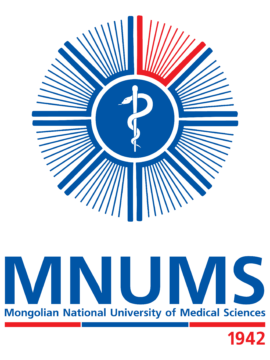Contact us
Hospitals and sanatoriums
DEVELOPMENT OF THE UNIVERSITY HEALTH SYSTEM IN MONGOLIA
The university hospital is dedicated to delivering reference-level healthcare through a specialized professions approach. This involves the provision of inpatient care, outpatient services, and the integration of advanced technologies into medical education and research. The university hospital also plays a pivotal role as a complex organization, offering professional guidance for other institutions involved in healthcare services, training, and research.
Comprising the Department for University Hospital Development and five hospitals, including the Central Hospital of MNUMS, Mongolia-Japan Hospital, Central Hospital of Mongolian Traditional Medicine, Central Dental Hospital, and the branch of MNUMS-Dent Hospital, along with the Clinical Molecular Diagnostic Center, Erkhes Sanatorium, and Bayanchandmani Sanatorium, MNUMS collaboratively provides healthcare services.
The university hospital team managed 7,227 inpatient cases, attended to 126,870 outpatients, conducted preventive examinations for 7,925 patients, and administered early detection tests to 2,644 patients. This constitutes 12% of the total nationwide healthcare recipients and 7.2% of outpatient examinations. Consequently, the burden-sharing for healthcare services at MNUMS is progressively rising in Mongolia.
The Central Hospital of MNUMS has inaugurated a Newborn Screening and Diagnosis Center, equipped for the early detection, diagnosis, and treatment of 4-5 types of diseases. Additionally, the horpital’s Diabetes Center extends its services nationwide.
By Government Resolution No. 64 dated February 9, 2022, the Mongolia-Japan Hospital underwent a complete transfer to the National University of Medical Sciences. The hospital now adheres to the ISO9001:2015 international quality management system standard. It provides a range of services, including arthroscopy, diverse tumor surgeries, a rehabilitation medicine center, an epilepsy center, a rheumatology center, a hemophilia center, and customer support services, reflecting Japanese management principles.
The Central Dental Hospital stands out in the treatment of oral mucosa disorders, implant procedures, facial and mouth defect treatments, orthodontic services, non-surgical cosmetic treatments, and orthognathic surgeries.
The Central Hospital of Mongolian Traditional Medicine delivers healthcare services through traditional methods, dietary practices, and alternative treatments. Ongoing multidisciplinary joint scientific research projects aim to explore the efficacy of traditional treatments, with the findings being implemented in clinical practice.
As of 2023, the workforce comprises 186 (27%) professors, 85 (13%) physicians, 153 (22%) nurses, 56 (8%) medical specialists, 58 (9%) in administration, and 143 (21%) in support services. Additionally, 1018 doctors in the main specialty and 451 doctors in specialized specialties are undergoing residency and specialized specialization.
To maintain a risk-free environment for clients and medical professionals, Japanese management practices are incorporated into services. The utilization of results-based clinical training methods, client-centered approaches, and effective treatment guidelines grounded in scientific knowledge and evidence is paramount. The provision of health education to the public and the ongoing organization of preventive measures significantly contribute to disease prevention.
The financial management of the university hospitals employs a combination of strategic purchasing, a single-buyer or performance financing, and a self-financed system to ensure the semi-autonomy of the hospitals.
Healthcare services are delivered by a proficient team of doctors and healthcare professionals, leveraging state-of-the-art diagnostic and treatment equipment. To expand this initiative, promote universal health coverage, and ensure equitable access to healthcare, university hospitals are effectively implementing the following projects and programs:
1.1. Project: “Upgrading Affiliated Hospitals’ Equipment” under the Concessional Loan from the Republic of Austria
As part of the Financial Cooperation Agreement between the Government of Mongolia and the Government of the Republic of Austria, Government Resolution No. 271 of 2021 approved the project to supply equipment to MNUMS hospitals. On March 21, 2023, during the 8th session of the Intergovernmental Commission for Economic Cooperation between Mongolia and Austria in Vienna, Republic of Austria, it was decided to implement the €7.5 million project to upgrade the equipment of MNUMS hospitals, specifically the Central Hospital of MNUMS, the Central Hospital of Mongolian Traditional Medicine, and the Central Dental Hospital.
The project encompasses the installation of imaging equipment, gastrointestinal endoscopy equipment, medical, bacteriological, and molecular diagnostic laboratory equipment, a vacuum surgery environment for advanced high-level surgery, a medical gas system, and endoscopic instruments for all types of surgery in the Central Hospital of MNUMS. Additionally, medical disinfection and washing equipment will be supplied.
This initiative marks a significant milestone for Mongolia as, for the first time, digital laboratory equipment for oral and maxillofacial surgery is being supplied to the Central Dental Hospital of MNUMS. This enhancement increases the opportunities for doctors to receive advanced training before and after graduation, offering the public crucial care services in this specialized field.
The Mongolian Medical Center Hospital of MNUMS received supplies of traditional treatment and sports injury treatment equipment, as well as imaging and clinical laboratory equipment through the project.
1.2. Project: “Construction of a 350-bed expansion building for the Mongolian-Japanese Hospital of the MNUMS”
The project encompasses three main activities: the acquisition of the hospital building, the installation of necessary equipment, the enhancement of the hospital’s human resources, and improvements in management. It is planned to have 64 diverse professional doctors and 144 nurses, along with 39 other medical professionals, totaling 247 doctors and medical professionals. Additionally, 672 pieces of equipment, including 164 types, and 350 patient beds will be procured to facilitate the provision of comprehensive care. The project aims to annually serve an average of 11,000 clients in specialized inpatient services such as internal medicine, neurology, surgery, pediatrics, gynecology, maxillofacial surgery, trauma, rehabilitation, and palliative care. Additionally, the hospital provides surgical care to 4,800-5,200 individuals, offering 24 basic and specialized outpatient services, 8 diagnostic cabinets, and an integrated laboratory with the capacity to serve approximately 600 people per day and around 150,000 people per year. The overarching objective of the project is to extend preventive and public health care services to all units within the city and the local service area.
1.3. Project for the Establishment of a “Newborn Screening and Diagnostic Center”
On January 31, 2023, with the support of the United Nations Children’s Fund, the “Newborn Screening and Diagnostic Center” was inaugurated at the Central Hospital of MNUMS. This center aims to prevent disabilities, enhance the quality of life, and maintain a healthy gene pool by conducting screening tests for the early detection of 5-7 types of disorders in infants. Since its inception, the center has analyzed blood samples from 4,095 maternity hospitals in Ulaanbaatar, 3,898 from rural areas, totaling 7,993 babies, resulting in the detection and monitoring of 3 newborns with disorders. Furthermore, on September 15, 2023, a branch of the newborn screening center was established at the children’s clinic of the Hovd provincial hospital. Future plans include preparations, as of November 22, 2023, to establish a newborn diagnostic center based on the children’s department of the Eastern Regional Diagnostic and Treatment Center.
1.4. Expansion Project of Erhes Sanatorium of the Central Hospital of Mongolian Traditional Medicine
To alleviate waiting times for medical care and enhance inpatient capacity, the Erhes sanitarium of the Central Hospital of Mongolian Traditional Medicine is undergoing expansion. Construction of a 100-bed hospital has commenced in 4 seasons, with the anticipated commencement of operations in the second quarter of 2024.
In 2023, university hospitals successfully implemented 17 new technologies, showcasing their advancements at the “Mongolia Health Technology Expo-2023” from September 22-24, 2023. The Mongolian-Japanese Hospital of MNUMS was recognized for introducing the most innovative technologies. The newly introduced technologies encompass a range of medical fields:
- Screening for Birth Defects, Metabolic, and Endocrine Disorders in Newborn Dried Blood Spots
- Colonic Microbiota Transplantation
- Orthopedic Intervention for Papillon-Lefebvre Syndrome Patient
- Ahizunber Formulation for Oral Mucosa Inflammation Treatment
- Utilization of Silicate-Based Cement Material with Calcium Hydroxide for LID Method Dental Canal Restoration
- Traditional Fire-Therapy Heating
- Tuiplan Treatment
- Comprehensive Portfolio of 33 PCR Tests at the Clinical Molecular Diagnostic Center
- Therapeutic Plasma Exchange (TPE)
- Cutting-Edge Vital U-Vitrea Workstation
- Shimadzu-Trinias C16 Unity Edition Biplane System (2018)
- AI-Assisted Analysis of Retinal Eye Images
- Extended Video-Monitored Electroencephalography
- Robotic Knee Replacement Surgery
- Implantation of Skin Substitute Tissue and Thin-Layered Skin Repair Treatment
- Dual-Balloon Endoscopy for Small Intestine Examination
- Endoscopic Ultrasound Diagnosis
The university hospitals of MNUMS are actively involved in ongoing community health education and disease prevention initiatives. Notably, a mobile medical team operated from June 7 to 10, 2023, providing surgical, urological, ultrasound, and gynecological care services to over 100 communities in Tsenhermandal and Jargalthaan Sums of Khentii Province. At the Surgical Department of the General Hospital in Khentii Province, four advanced laparoscopic surgeries were successfully performed, providing valuable on-the-job training.
With the support of the United Nations Children’s Fund, on September 16-17, 2023, the university hospitals delivered oral health care services to 957 children at Kindergarten and School of Darvi Sum in Hovd Province. Additionally, 712 residents received internal, pediatric, neurological, and gynecological examinations and diagnostics.
On October 27-28, 2023, when more than 480 children participated in an oral hygiene examination at the Ikhtamir Sum’s School in Arkhangai province. Furthermore, over 400 residents received healthcare services in the fields of internal medicine, neurology, pediatrics, women’s health, and imaging.
“University Hospital System” Symposium
In commemoration of the 50th anniversary of diplomatic relations between Mongolia and Japan, the Ministry of Foreign Affairs of Mongolia and the National University of Medical Sciences (MNUMS) collaboratively organized the “University Medical System” Symposium on April 19, 2022. The event adopted a hybrid format, blending a physical presence at the University with an online component, skillfully orchestrated by the Hospital Development Department. Thirteen distinguished speakers, including representatives from MNUMS, Tokushima University, Nagoya University, and JAICA’s Mongolia office, delivered insightful presentations covering three pivotal areas: university hospital system law, management, healthcare services, and human resources. The symposium garnered significant research contributions, with a total of 68 abstracts submitted by participating researchers.
“Clinical medicine and university hospital management” joint symposium
On September 28, 2022, in anticipation of MNUMS’s 80th anniversary, a joint symposium was held in collaboration with the International University of Health and Social Welfare (IUHW) of Japan. The symposium, hosted at the Ministry of Health in Ulaanbaatar, brought together 300 doctors, medical specialists, and teachers from specialized central hospitals in urban and rural areas, national centers, medical institutions, local medical facilities, and MNUMS. The event was organized by the University Hospital Development Department. During the symposium, 2 professors from the International University of Health and Social Welfare in Japan and 4 professors from MNUMS covered various topics, including the measures adopted by Mongolia and Japan during the Covid-19 epidemic, advancements in liver transplantation, and university hospital management.
“Hospital Management” international training and symposium
On November 30, 2023, an international training and seminar on “Hospital Management” is scheduled to take place in a hybrid format, combining online and classroom sessions. The workshop will feature the participation of academic professors from MNUMS, Clermont Auvergne University (France), Kazakh National University, Ankara Hadji Bayram Veli University (Turkey), and Kaohsiung Medical University (Taiwan). The discussions will cover various topics, including performance-based financing, medical quality of care, customer safety, analysis of medical data for decision-making, reduction of the burden on the health sector, introduction of efficient management, and the management and modeling of medical care processes. Additionally, seminars focusing on hospital performance-based financing and the management and modeling of medical care processes will be conducted.
To facilitate the comprehensive development of the university hospital system and the training of competent doctors and medical specialists in Mongolia across undergraduate, graduate, and post-graduate, an operational contract is annually established in collaboration with national reference-level hospitals, general hospitals, maternity hospitals, district general hospitals, and private sector hospitals.
This collaboration results in undergraduate internships, post-graduate majors, and specialized specializations being aligned with the hospital setting, enhancing the skills and capabilities of doctors and specialists. Moreover, the university actively supports the research endeavors of medical professionals in these hospitals. University scientists and educators contribute by delivering contemporary training to the respective hospitals, ensuring regular exposure to new medical technologies and updated clinical guidelines. The cooperative efforts yield numerous benefits for both the university and the participating hospitals.

Bayanchandmani Sanitorium

Darkhan Hospital














